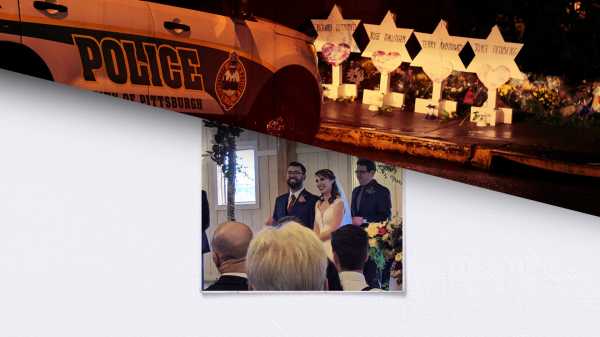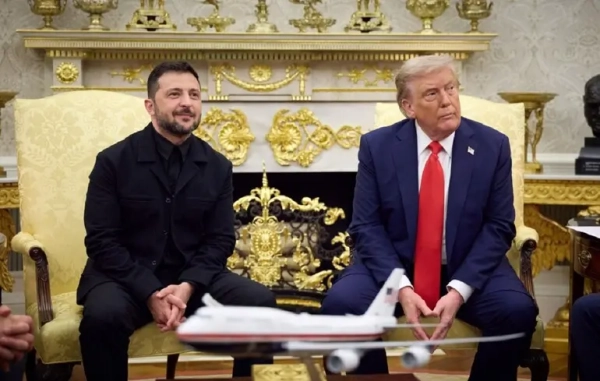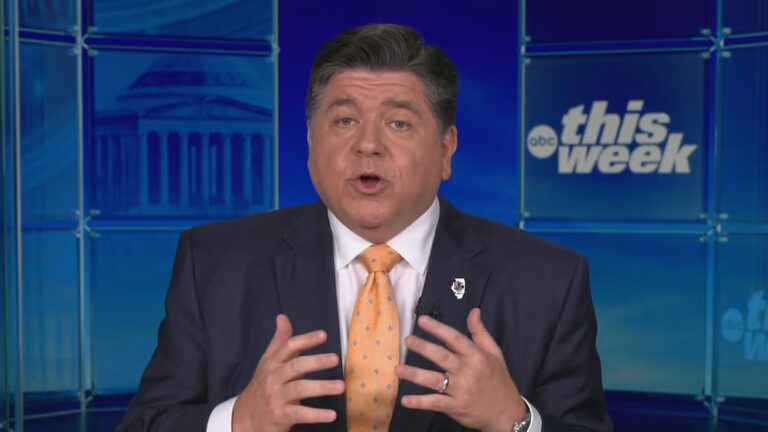
Last Saturday, about three hours before my wedding, I waited in a hotel room with my rabbi and watched cable news reports of a massacre at a synagogue not far from where we were.
The Pittsburgh synagogue shooting, the deadliest act of anti-Semitic violence in recorded American history, was a terrorist attack aimed at the heart of the Jewish community. The shooter, who openly said he wanted to “kill all the Jews,” was sending a message: that even in America, where Jews like my grandparents had found refuge after the Holocaust, you are not and never will be safe.
And our wedding was held under the explicit threat of anti-Semitic violence.
About two months prior, a group of online anti-Semites angry with my reporting had published its date and location and threatened to crash the celebration. They defaced our online guestbook with anti-Semitic posts and promises of violence. One message, from “Joseph Goebbels,” promised my wife Katie and I that “some day soon you will shut your lying mouths for good.”
A security consultant concluded, after an investigation, that the threats were not serious. And indeed, our wedding was lovely and unmarred by violence. But the Tree of Life shooter had marinated in similar online alt-right forums as the ones from which our threats emerged. He proved that the skyrocketing levels of hate speech directed at American Jews recently are not merely the idle chatter of bored internet trolls. This new wave of anti-Semitism could, and in fact did, produce a kind of American pogrom.
Under those circumstances, my wedding to Katie was no longer solely a celebration of our happiness. It felt like an act of defiance.
Jewish life in the face of Jewish death
I met Katie in the latter half of 2015, and fell in love quickly. She was not Jewish, but she began reading about Judaism after seeing how meaningful it was to me.
Katie’s an academic, and she approached Jewish studies with a scholar’s diligence. She connected with the rich intellectual core, emotional heart, and beauty of Jewish ritual in a way that, she told me, came as a real surprise. She converted about a year before our wedding.
During Katie’s conversion, she saw the best parts of Judaism. She didn’t see the suffering that I had glimpsed growing up: the numbers tattooed on my grandfather’s arm; the more subtle but far more profound psychological scars of an Auschwitz survivor who escaped a death march in 1945 by hiding under a dung pile in the Bavarian countryside.
HIAS, the Jewish refugee resettlement group, brought my grandfather and grandmother over to the United States after the war. My mother was born on American soil, a birthright citizen; if it weren’t for HIAS’s assistance, she never would have been here to meet my father. This was the organization the Pittsburgh shooter singled out before he set out on his rampage. He was enraged by its work helping the modern-day equivalents of my family coming to America.
This is the duality of modern Jewish life: We are tasked with maintaining a beautiful and ancient tradition in the face of the knowledge that some people want to kill us for doing so. Every joyful Jewish event operates with this understanding humming in the background.
We didn’t want our wedding to focus on Jewish suffering. Katie and I wanted our day to be about the joy of Jewish life, about the new Jewish home we were creating together. There were little touches — my grandfather’s prayer shawl on our shoulders, my Great-Uncle Josef’s shawl on the top of our chuppah — to remind us of our ancestors, many of whom had suffered terribly. But we wanted to celebrate our lives and our future: to share our joy with our friends and family.
The Pittsburgh shooting reminded us that there is no neat separation between Jewish joy and Jewish suffering. The shooter attacked the Tree of Life synagogue during a bris, the ritual circumcision and party marking the entry of a new Jewish boy into the world. It is the very fact of us living Jewishly that these people hate; conversely, every part of Jewish life that we live publicly is a declaration of victory over their project.
So even after the shooting, the wedding went ahead as planned. We stood under the chuppah and exchanged rings; we broke the glass and were hoisted up on chairs and danced the hora. This was, to my mind, the best way we could honor the 11 victims in Pittsburgh: to show that Jewish life goes on in the face of those who want it to cease, that our family will continue the legacy that they died attempting to preserve.
Never again?
In the days following the wedding, Katie and I went away on a mini honeymoon. I had initially resolved to stay away from work and the news during those precious newlywed days.
But the enormity of the Pittsburgh shooting hit home after the wedding ended, and I could not stop reading. What struck me the most, aside from the pain of the Jewish community, was the insulting response from our political leadership.
President Trump has not ceased blaming the “migrant caravan” on George Soros, a wealthy Jewish philanthropist and Holocaust survivor; just Wednesday, he said “he wouldn’t be surprised” if Soros were behind it all. This idea, that Jews are behind mass migration, appears to be the reason the Pittsburgh shooter launch his killing spree. (Soros, long an object of right-wing scorn, was himself one of the more than a dozen prominent Democrats and Democratic donors who were mailed pipe bombs in recent weeks.)
Vice President Mike Pence invited a fake rabbi, Loren Jacobs, to offer a post-Pittsburgh prayer for “unity” at a campaign rally. Jacobs is actually a Christian missionary dedicated to converting Jews — that is to say, to weakening the Jewish community — and a defrocked one at that. His comments at the rally contained references to Jesus and a call for a Republican victory in the 2018 midterms; he did not name a single one of the Pittsburgh victims.
This offensive response was in no way surprising: The White House’s response to hate crimes is quite typically tone-deaf and insulting. But this one felt different.
As a Jew mourning with my community, I wanted a promise from my political leadership: a pledge of support for American Jews, an offer that the people in power will do everything they can to protect my new family from another massacre. What I got was the opposite: a callous indifference to our justified sense of fear, and repetition of the same kind of anti-Semitic conspiracy theories you heard from people like the Pittsburgh shooter. While both Pence and Trump offered denunciations of anti-Semitism, their words felt pro forma in light of their actions.
The essential truth of diaspora Jewish life is that we are, and always will be, a minority. Because we exist in largely non-Jewish societies, we depend on the goodwill of the non-Jews who run these societies for our safety and survival. The worst anti-Semitic acts in history had been either perpetrated by governments or implicitly sanctioned by them.
During my mini honeymoon, which was supposed to be filled with joy, I was at times overcome by anger. America’s most visible leaders, the president and vice president, were showing me, my wife, and our community that they were not on our side — that they did not hear our concerns, did not feel our pain, and were indifferent to the scary historical resonances that their behavior brought up in the Jewish mind.
Being Jewish and a newlywed creates a sense of obligation: As the ebullience of the wedding reception recedes, the hard work of building a Jewish family looms ahead of you. The past week has woken me up to the fact that many people in my country, represented by the president himself, are at best indifferent to our community’s fate. It is a hard lesson in being a minority that I will never forget.
I don’t want to leave you with the sense that the shooting ruined our wedding. Far from it: It was a beautiful day, full of memories I will never forget. My best man breaking down during his toast; Katie’s sisters calling me “brother” for the first time; Katie, stunning in her long white dress. These memories, not the sense of persecution and threat, are what run through my head when I think of that day.
I wish those scenes could serve as an unalloyed testament to the strength of the Jewish community in the face of horrible violence. But my reveries are tempered by a disquieting thought, grown louder in the past few days: that our fellow Americans do not have our back.
Sourse: vox.com






